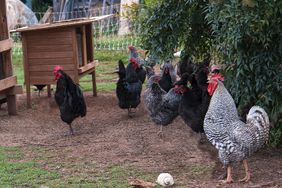:max_bytes(150000):strip_icc()/102208984-64cbe79f4dba40a3a9052df444e7ae48.jpg)
Not so long ago, chickens were part of nearly every farm, and anyone who lived in the country (and some people who lived in town!) would raise chickens for eggs.
If you're considering raising chickens, it's important to first decide what kind of eggs you want. Do you prefer large or small eggs? Plain white, or a fancier color like brown or even blue? And how many eggs can you use per week?
Here's the answer to the age-old riddle: The chicken comes before the egg. That's because you select a hen breed according to the kind of eggs you want. Bud Wood owns a hatchery and says there are obvious differences.
"The very best laying hens are commercial hybrids," Wood says. "And there is what we call a Red Star. It's a Rhode Island red cross and it lays a nice big brown egg. And then a White Leghorn and it's also a commercial breed, it lays a nice big white egg."
It's kind of fun to experiment with the different breeds. The breed you choose also determines how many eggs you'll get per week. Keep track of the chickens that are not laying eggs. Feed is expensive. Before you cull the flock, make sure the birds are old enough to lay eggs in the first place.
"The commercial layers can start laying at 17 weeks," Wood says. "Some of these breeds will take up to 24-plus weeks before they'll start laying. And it also depends on how you care for them. The healthier the bird, the better cared for it is, the earlier they'll go into production."
Once you've decided on a type of chicken, you'll need to make sure you have proper accommodations for them. Then, in no time at all, you'll be enjoying fresh eggs with your morning toast.
Having a flock of chickens ensures you'll always have high quality eggs and meat.




